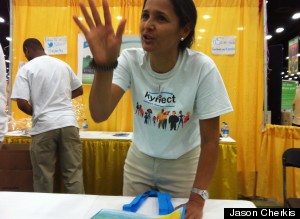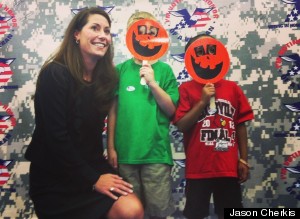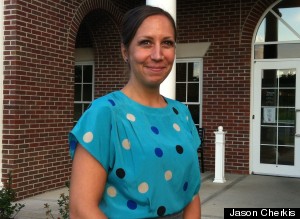LOUISVILLE, Ky. -- A middle-aged man in a red golf shirt shuffles up to a small folding table with gold trim, in a booth adorned with a flotilla of helium balloons, where government workers at the Kentucky State Fair are hawking the virtues of Kynect, the state’s health benefit exchange established by Obamacare.
The man is impressed. "This beats Obamacare I hope," he mutters to one of the workers.
“Do I burst his bubble?” wonders Reina Diaz-Dempsey, overseeing the operation. She doesn't. If he signs up, it's a win-win, whether he knows he's been ensnared by Obamacare or not.
The Patient Protection and Affordable Care Act -- Obamacare -- totals 974 pages, and in the popular imagination is several times longer. How the complex law unfolds could very well determine the winner of Kentucky's high-stakes 2014 Senate race pitting Senate Minority Leader Mitch McConnell (R) against Democratic upstart Alison Lundergan Grimes -- and along with it control of the upper chamber.
But Diaz-Dempsey has managed to distill it all down to three sentences.
We are Kynect -- part of the new health care law.
Do you know anyone who doesn’t have health insurance?
You may qualify for Medicaid or a tax credit based on your income.

Diaz-Dempsey brought her pitch on Tuesday morning to the Kentucky State Fair. At 44, she is direct, even pleading, as she leans her slight frame against the table, inching closer to fair-goers driving rented scooters and wearing church T-shirts. She isn't just competing against the sizzle of deep-fried Kool-Aid (funnel cake dough flavored with the powdered drink mix) and Krispy Kreme donut burgers ("Fresh -- Never Frozen" the sign beckons) from just outside Freedom Hall. She is up against the state's history of poor health and limited choices, Appalachian poverty and conservative orthodox. Diaz-Dempsey, a public health worker for 19 years, has waited a long time for this moment, even if she has to jockey with the chocolate corn dog guy for attention.
At first, Diaz-Dempsey says, she was overwhelmed by the hordes. All of her study on the issues got her tongue-tied. The policy analyst had to become a carnival barker. "All right," she thought to herself. "Okay, what are we telling them?"
In 40 days, Obamacare heatedly, controversially, launches in Kentucky. Diaz-Dempsey must move beyond the debates over the legislation and start selling it. I explain Diaz-Dempsey’s mission to a spokesman for a massive Kentucky hospital chain at a booth nearby “Good luck with that," he smirks.
But Diaz-Dempsey has a secret weapon: tote bags, designed with a tableau of Kentucky residents under a bright sun and the Kynect logo. The state had spent millions establishing the exchange, staffing up outreach, and conducting market research that included holding a dozen focus groups in Louisville, Paducah and London, according to Gwenda Bond, assistant communications director with the Cabinet for Health and Family Services. The respondents, according to the final focus-group report, felt the logo designs were “comforting,” “hopeful” and “reassuring.” The bags stuck to that theme. They showed only one obese character.
Diaz-Dempsey and company cannot hold onto the bags. At a recent Louisville Bats minor league game, Kynect staff say they handed out 600 bags in 20 minutes (“It was Bobblehead Night too.”). In less than seven days at the fair, they've given out roughly 15,000 bags. Kentucky voters may hate the idea of government handouts for the uninsured, but they had their hands out for these tote bags. With each bag, Diaz-Dempsey and her staff drop packets of information on signing up for Obamacare into outstretched hands.
On Oct. 1, the health exchanges, a central component of Obamacare, will open up for business across the country. For the exchanges to provide affordable, dependable coverage, millions of the uninsured need to sign up. As the deadline approaches, Republicans led by Sen. Ted Cruz (R-Texas) are threatening a government shutdown in a quixotic attempt to stop implementation. House leaders are eyeing using the debt ceiling to hobble Obamacare.
In Kentucky, the stakes are high. The long political career of McConnell, a strident Obamacare opponent, may hinge on the success or failure of the rollout. "It could backfire on him," says Rep. John Yarmuth (D-Ky.) of McConnell's leading opposition to the health care reforms. "I could see next July, August, September people waking up, saying, 'You know he lied to us about this.' I think that's going to be the case."
By late morning, the crowd grew into a line 18-deep. They lurched up wearing XXL fanny packs, ball caps that let you know what war they fought in, and faded XXL shirts that sermonized across the chest “Dixie Heritage Be Proud of Your Past" looking for the bags. But Diaz-Dempsey had a rule: Listen to her three-sentence pitch and only then will she hand over the swag.

When an elderly man cut in line and pulled at her stack of bags, she gripped the tote bags even tighter. She wasn't letting go. Finally the man, wearing a trucker hat, red shorts, and white tube socks, slunk away, headed toward the dull, corporate swag being handed out by the health care company Humana.
The crush of people don't greet Diaz-Dempsey with tea party dogma or amateur constitutional scholarship. No one is there to complain about the individual mandate or heckle about death panels. They have questions.
They wonder if they could get coverage despite having a pre-existing medical condition, how much it will cost them. They ask if Indiana has a similar program, or if this was only for Kentucky. Could they just enroll their child? They talk about their sons and daughters, neighbors going without health care, and ask about the subsidies.
The vast majority are relieved to learn about the health exchange. Linda Parrish, 47, showed up at the table and gushed to Diaz-Dempsey: "This is what I've been waiting on." Parrish has health insurance, but her best friend doesn't.
Regina Rice, 47, on a school field trip with her son and his classmates with special needs, had sought out Diaz-Dempsey not so much for the tote bag, but for the information tucked inside it. “I’m praying that it helps us,” Rice says, adding that she has prayed for Obamacare. "I prayed to God to get our people in the right direction to help poor people. I think they are going in the right direction."
Rice says she hasn’t had insurance for close to 10 years. Rice, a Democrat, left her state job to care for her children, including her son with cerebral palsy. Her husband, a self-employed house painter, can’t afford coverage. Now, she says, the phone rings off the hook from bill collectors demanding payments on their $20,000 in medical debt from her husband's chronic back pain and a knee surgery, and her migraines. “We can’t even file for bankruptcy,” she says. The cost to file is out of reach.
At the end of June, Rice says she blacked out in a store. The ambulance ride and emergency room totaled another $2,000 she doesn’t have. Diabetes runs in her family; she worries that she has it, too. It’s been years since her last pap smear and mammogram. If she had cancer, she wouldn’t know it. “I worry about that every day,” she says. “What do you do? I cry a lot.”
Rice begins to tear up. Her daughter wants to move on to other attractions. Rice gathers herself and walks away, clutching her new tote bag. That night when she came home, she went over the Kynect materials with her husband. She's worried that she can't afford it. Her husband told her, "All we can do is apply. If God wants us to get it, we'll get it."
THE NONBELIEVERS
During the two days that I attended the fair, Secretary of State Grimes was the one Kentuckian immune to the gravitational pull of Kynect totes.

Grimes made a late-morning appearance on Monday for an informal grip-and-grin with veterans at her secretary of state booth. She hugged old ladies and high-fived kids, offering facts. She encouraged veterans to sign a board that would then be displayed at schools across the state. The goal, she told one supporter, was “to show the importance of civic health.”
Grimes put off my questions about health care, saying she was on “state time.”
At a "Grannies for Grimes" event the following day, Grimes provided her most complete defense of Obamacare to a Louisville television station, arguing that it would spur job growth and provide relief to the 640,000 Kentucky residents without access to health insurance.
"As I've said before, I'm troubled with certain aspects of the Affordable Care Act," Grimes said. "But we're here at the state fair and if there's three reasons why Kentuckians -- especially our seniors -- need access to affordable health care coverage, you just have to look over to the right where you see the donut burger, the chili cheesesteak and the covered french fries that are here."
Still, Grimes left without stopping by the health exchange booth.
Grimes’ own anxiousness seems reflected across Kentucky and across party lines. Health care is always a fraught subject, where trust is rare, and where even the luckiest contend with aloof doctors and indifferent, complicated insurance. One Obama supporter, Sallie Dailey, explained to me that although she believes in Obamacare, she is frightened that so much still depends on private insurance -- the same companies that charge her daughter who has diabetes $677 per month.
Dailey admits that McConnell and company's hammering is having an effect on her daughter. “She reads all the crap," Dailey says. "She begins to doubt. Can it ever be better?”
The new Obamacare rates in Kentucky have yet to be made public. The specifics of the plans are still a mystery. Who knows how many young adults will sign up or how the Medicaid expansion might impact access to doctors. “It’s almost like painting a blank canvas,” says Democratic state Rep. Jimmie Lee, a statehouse guru on Medicaid.
Although McConnell, facing a primary challenger, has made his opposition plain and the tea party has vigorously opposed the law in court filings in the state, there has been little conservative uprising. John Kemper III, a co-founder of the United Kentucky Tea Party and a 2011 Republican nominee for state auditor, says he wants to wait and see what happens when the law is implemented.
“Most people don’t really understand it yet,” said Gov. Steve Beshear (D) in an interview with The Huffington Post. “I do not find that most people have any kind of negative feeling about it. It’s just that most people don’t quite understand the act or what they’re supposed to do yet.”
The good news for the state –- if the state is open to accepting it –- is that federal officials are impressed with Kynect. “I know that the administration believes that Kentucky and Vermont are the two best exchanges that were created, that are models for the country,” Yarmuth, the Democratic congressman, says. “They’ve said that numerous times to the Democratic caucus.”
This may be the first and last time Kentucky is in the same sentence as Vermont. Obamacare, without Diaz-Dempsey and her tote bags, is still a tough sell.
Erin Hoben, an outreach worker with Kentucky Voices for Health, a coalition pressing for affordable and effective health care, has crisscrossed the state breaking down Obamacare to residents and health care workers. “There’s a lot of mistrust,” she says.

Hoben, a Louisville native, studied law and worked in New York City before moving back home. “I don’t tell people I lived in New York for a while," she says. "That would not be acceptable. Me coming in -- they don’t know me. It's hard to gain trust. And I’ve been telling them the opposite of what they’ve heard for the last year. It’s really hard.”
A woman Hoben had been working with in Hazard called her recently to tell her that the tea party had urged her not to enroll because the exchange wasn’t happening. She went door to door with a free lunch program in Laurel County. She met a mother in a trailer, she recalls, who believed she was going to jail if she didn't sign up for insurance. What startled Hoben was that the mother seemed to just erroneously accept the potential jail time as a fact of life. "I quickly explained to her that was not going to happen," Hoben says.
On Monday afternoon, I leave the fair and head east to Appalachia to meet Hoben at the public library in Laurel County. People without insurance make up 20 percent of the county's population. Half of those residents earn so little that they would qualify for Medicaid under the expansion when it starts in January. Only 11 residents -- including a handful from the county health department -- show up for Hoben’s 6 p.m. presentation.
Hoben tries her cheery best to explain the benefits of Obamacare with its expansion of zero-cost prevention services and protections for those with pre-existing conditions. At the end of her half-hour lecture, she posts a section called “Debunking Myths,” where she has to explain that the feds would not force anyone to drop their insurance and that the law has withstood legal challenges.
The county’s health department workers worry about doctor shortages that could be caused by the Medicaid expansion. “We actually had a lady in the clinic this afternoon," one worker explains. “She said the pediatrician in this area couldn’t see her child until November. That concerns me that there’s not enough providers in this area.”
“It’s a legitimate concern,” Hoben replies.
A resident chimes in about the qualifications of the Kynect workers who will be assisting residents navigate the system, and declares that the doctor shortage will get worse. “There are doctors in this area that are going to be dropping out because they don’t want anything to do with this,” she says.
Lana Carnes, a specialist with a local insurance company, jumps in convinced that employers are going to drop coverage on their workers. Employee benefits will get worse.
Hoben counters that the exchange's plans will be robust and competitive.
“I think to assume things ...” Hoben says. Carnes cuts her off. “But that’s all that this is, is a bunch, a lot of assumption. I mean we’re assuming that this is going to work.”
After the meeting, the naysayers -- admitted fans of Sen. Rand Paul (R-Ky.) -- argue that the real problem is all their neighbors running to the emergency room for any little ailment. A few miles down the road, I find Saint Joseph Hospital in London just off the interstate. In the emergency room, I find only deeper mistrust in the system.
Deborah Brown, 56, had brought her husband in. He recently had a stroke and now there were blood pressure worries and complications. Although they had an appointment with their physician for the next day, he had told them to go to the ER. Brown says she had to borrow her sister-in-law’s GMC Envoy to make the 26-mile drive.
Brown is convinced Obamacare will just help the rich. “He’s going against his word,” she explains. "He made all those promises about how he was going to help the poor, the elderly."
Danielle Smith, 26, sits in the back of the waiting room with her blond 19-month-old son. Something, she is convinced, has burrowed inside a crevice in her son's ear. Maybe it's a tick. She drove 20 miles to Saint Joseph, skipping another hospital near her home. She says she doesn't trust that place.
A half-hour later, Smith marches out of an exam room clutching her boy and looking even more determined. “They said it was a freckle,” she explains, rushing to her car in the darkened, quiet lot. “So we’re going to get a second opinion.” The night was still young. It was 9 p.m.
Pretty soon, Christopher McClure hobbles through the doors, his inner thigh hurting from what he suspects are a pair of spider bites. He is not employed and does not have health insurance. His wife Michelle, 29, works as an assistant manager at a pizza chain making $12,000 a year. She also has no insurance and would qualify for the Medicaid expansion. But she's against Obamacare, convinced that it will wipe out her meager earnings. “Next enrollment season," she says, "they’re going to sock it to me.”
LAST PITCH
On Tuesday afternoon, Diaz-Dempsey works an extra 10 minutes past her shift at the fair. She had started to gather her things, but then saw the crowds continue to gather at her table and jumped back in, making her three-sentence pitch. "Reina, you're still here," admonishes a co-worker.
Finally, during a quiet moment, Diaz-Dempsey leaves her booth and heads into the fair’s parking lot. A large crowd has gathered at the mini-race track for the Doberman races. Acrobats stretch and twirl in the adjacent space. Seniors cradle funnel cake in their arthritic hands.
The night before, Diaz-Dempsey's husband, Greg, started asking questions about the new law and Kynect, she tells me. He wanted to know how it could work for him and his small, tree landscaping business. He was tired of the high turnover rate of his employees. He knew not being able to provide them benefits had been a factor. He understood why they quit.
Diaz-Dempsey gave her husband a detailed account of how it might work, how he could get tax credits.
“I think he’ll do the right thing,” Diaz-Dempsey says.
But she’s not 100 percent sure. Times are tough. “I don’t know if he’ll be able to or not,” she says.

